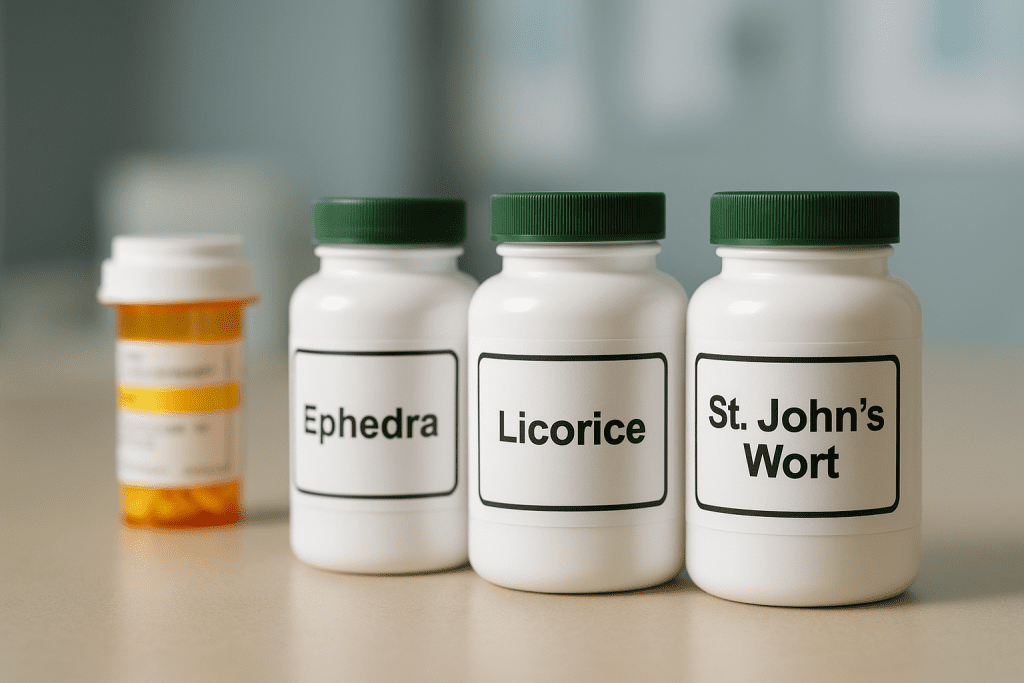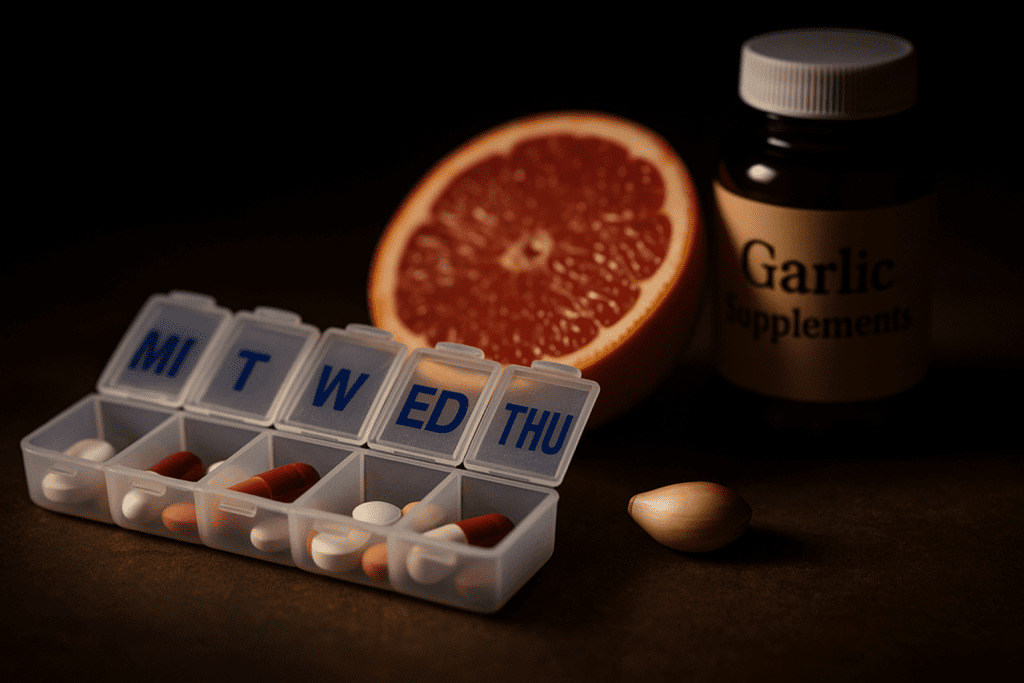If you have heart failure, certain supplements and herbal remedies can interfere with your medications or even worsen your condition.
This article outlines the most critical heart failure supplement contraindications, from licorice and L-arginine to St. John’s wort and grapefruit juice.
You’ll also learn how to spot risky interactions and get guidance on safer options. Knowing which products to avoid is essential for managing blood pressure, arrhythmias, or fluid retention.
Summary / Quick Answer
Some supplements pose serious risks for people with heart failure by altering heart function or interfering with medications. Always consult your cardiologist before starting any supplement.
Supplements to Avoid for Heart Failure Patients:
- Ephedra: Raises heart rate, can cause cardiomyopathy
- Licorice: Can cause hypertension and arrhythmias
- St. John’s Wort: Interferes with multiple HF drugs
- L-arginine: Linked to deaths in post-heart attack patients
- Grapefruit Juice: Alters metabolism of key heart meds
- Red Yeast Rice: Contains statin-like compounds, risk of overdose
Tip: Use tools like the best app for tracking vitamin and drug interactions to stay informed.
How Supplements Can Disrupt Heart Failure Treatment
Heart failure (HF) occurs when the heart can’t pump blood effectively, leading to fatigue, fluid buildup, and organ strain. Managing HF usually involves a delicate balance of medications like beta-blockers, ACE inhibitors, diuretics, and anticoagulants.
But supplements – even those labeled “natural” – can interfere with this balance.
Why This Matters:
- Some herbs affect fluid balance or blood pressure
- Others interact with liver enzymes (CYP450), changing drug levels
- Several can amplify or block medication effects
For example, potassium supplements can dangerously raise blood potassium when combined with ACE inhibitors – a concern explored in our guide on CoQ10 and blood pressure medication overdose risk.
Here’s a breakdown of the most problematic supplements.
Supplements That Directly Harm Cardiac Function
Certain supplements can worsen heart function or increase the risk of arrhythmias, hypertension, and cardiac arrest.

Ephedra (Ma-huang)
- Stimulates the heart and raises blood pressure
- Linked to arrhythmias, heart attacks, and new-onset heart failure
- Still found in some products despite FDA bans
A case series published in PubMed showed that discontinuing ephedra significantly improved heart function in six patients with new heart failure source.
Bitter Orange
- Contains stimulants similar to ephedra
- Counters blood pressure-lowering medications
- Increases heart rate and stroke risk
Licorice (Glycyrrhizin)
- Causes hypertension and potassium depletion
- Potentiates digoxin toxicity – a serious danger in HF patients
According to the American Heart Association, licorice is explicitly flagged as unsafe for people with heart failure.
| Supplement | Risk Summary |
|---|---|
| Ephedra | Hypertension, cardiomyopathy, arrhythmias |
| Bitter Orange | Elevated HR/BP, stroke risk |
| Licorice | Hypokalemia, digoxin toxicity |
Supplements That Interact With HF Medications
Some supplements alter how heart failure medications are absorbed, metabolized, or eliminated.
St. John’s Wort
- Induces liver enzymes (CYP3A4), lowering drug levels
- Weakens warfarin, statins, digoxin, and anti-arrhythmics
- Risk of serotonin syndrome with SSRIs
Grapefruit Juice
- Inhibits enzymes that metabolize medications like carvedilol, amiodarone, and statins
- Can dangerously increase blood concentrations of these drugs
See more in this Mayo Clinic overview on grapefruit and heart meds.
L-arginine
- Linked to increased mortality in post-heart attack patients
- Amplifies effects of antihypertensives and anticoagulants
- May cause potassium spikes with ACE inhibitors

| Supplement | Affected Medications | Risks |
| St. John’s Wort | Warfarin, statins, digoxin | Reduced efficacy, clots |
| Grapefruit | Statins, anti-arrhythmics | Drug buildup, toxicity |
| L-arginine | ACE inhibitors, blood thinners | Hypotension, hyperkalemia |
Supplements That Increase Bleeding Risk
Heart failure patients on anticoagulants face added danger from supplements that thin the blood.
Ginkgo Biloba
- Enhances bleeding when combined with aspirin, warfarin, or NSAIDs
Garlic Supplements
- High doses increase warfarin’s effect
- Different from garlic in food
Danshen
- Potentiates anticoagulants
- Used in traditional Chinese medicine
For a safer alternative, use a symptom logger for drug-nutrient side effects to monitor any issues in real time.
Other Supplements That Warrant Caution
Red Yeast Rice
- Contains monacolin K (a natural statin)
- Unpredictable potency
- May cause muscle damage or rhabdomyolysis
Vitamin E
- High doses linked to increased heart failure risk
- May raise hemorrhagic stroke incidence
Hawthorn
- Interacts with cardiac glycosides and nitrates
- Alters heart medication effectiveness
Aconite, Gossypol, Yohimbine
- These compounds have shown pro-arrhythmic effects
- Gossypol also enhances diuretic side effects, risking potassium loss
| Supplement | Risk Type |
| Red Yeast Rice | Statin overdose, muscle pain |
| Vitamin E | HF worsening, bleeding |
| Hawthorn | Alters heart med efficacy |
| Aconite/Yohimbine | Arrhythmia, BP fluctuations |
Safer Strategies for Supplement Use
While many supplements are off-limits for people with heart failure, safe use is possible with medical oversight.
Guidelines to Follow:
- Disclose all supplement use to your healthcare provider
- Avoid anything that alters heart rate, BP, or blood thinning
- Choose products evaluated by independent labs – try our app comparing supplement brands for purity
- Use digital tools like a symptom logger for drug-nutrient side effects to track reactions
Conclusion
For heart failure patients, supplement safety isn’t optional – it’s vital. The wrong product can undermine your treatment or trigger dangerous complications. Avoid high-risk supplements like ephedra, licorice, and St. John’s wort, and always check for potential HF medication interactions before trying new remedies.
To stay safe:
- Talk to your doctor before adding any supplement
- Stick to verified brands
- Monitor side effects with tech tools that keep you informed
For more detailed guidance, check our post on CoQ10 and blood pressure medication overdose risk.

